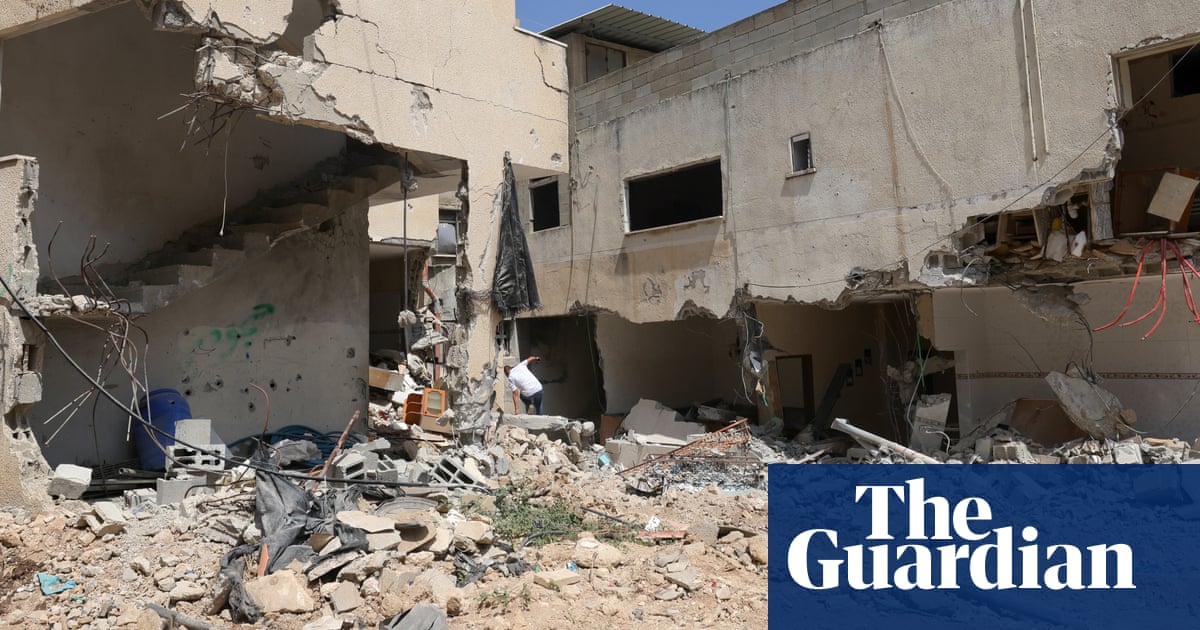Israel said it has killed three militants including a senior Hamas official in an airstrike on a car outside Jenin on the third day of extensive military operations across the West Bank.
The campaign, according to Israeli leaders, is designed to pre-empt attacks on Israelis after a suicide bombing in Tel Aviv this month, the first for eight years.
The operations have involved widespread destruction, mass detentions and targeted killings. The target on Friday in the outskirts of Jenin was a local Hamas commander, Waseem Khazem. He was reportedly killed with two other alleged Hamas members when their car was hit in a drone strike.
The Palestinian health ministry confirmed that three people had been killed in Zababdeh, a town south of Jenin, but did not disclose their identities.
At least 19 Palestinians have been killed since the West Bank operation began early on Wednesday. Hamas has said 10 of the dead were their fighters.
In the early hours of Wednesday, another militant leader, Muhammad Jabber, widely known as Abu Shujaa, was killed in a shootout at a mosque which killed four other Palestinian fighters near the Nur Shams refugee camp in the city of Tulkarm.
While intended as a show of resolve, the West Bank campaign has also highlighted how stretched Israel’s forces have become, and how far they are from fulfilling the primary war aim of destroying Hamas politically and militarily.
After more than 10 months of bombing in Gaza, causing mass civilian deaths, Hamas is still able to function as a guerrilla force in the territory, and its popularity, along with the appeal of armed action in general, is rising across the West Bank.
“This is not the end of resistance. This is just the beginning and it will draw in the whole region,” warned Abu Assad*, sitting in the corner of a hardware shop in the West Bank town of Qalandiya.
Assad, 54, was nervous and agitated and rose out of his chair in anger when he described what he saw as the betrayal of the western world but also of the Palestinian Authority, the putative but largely powerless civil administration in parts of the West Bank.
The Palestinian Authority has condemned the IDF attacks, focused on Jenin and Tulkarm, but Assad dismissed the outrage as theatre. He accused the authority of “giving the green light” to the Israeli military to eliminate its more radical rivals that it had been unable to neutralise itself.
“It was totally coordinated between the PA and Israel,” he insisted. “They tried many time to catch them and they failed, so they said: ‘Come, mow the grass for us, and we will take care of the rest.’”
The US peace plan for Gaza imagines the coastal strip governed once more by the authority, albeit a “revitalised” version. But contempt for the authority was universal on Friday afternoon in the narrow busy streets of the Qalandiya refugee camp, established in 1949 for Palestinians displaced by the war with the emerging state of Israel the previous year.
The only difference of opinion was whether it was just incompetent or actively conniving with Benjamin Netanyahu’s rightwing coalition. Abu Shujaa, on the other hand, was spoken of as a fallen folk hero.
“Everybody respects him, like they respect all the fighters, because they are defending the people’s rights,” Abu Suhaib, a 58-year-old camp resident, said as he emerged from midday prayers.
The few restraints on Israeli settlers were relaxed after the 7 October Hamas attack on Israel and the start of the war in Gaza. Since then they have launched murderous attacks on Palestinian West Bank communities with near total impunity.
According to UN figures, there have been 1,270 settler attacks against Palestinians since 7 October, 120 of which have “led to Palestinian fatalities and injuries”.
Altogether, 600 Palestinians have been killed by the army and settlers since the onset of the Gaza war, while the authority’s police force has been unwilling and powerless to protect the population.
In the West Bank, gun-toting militants are more inspiring than the pervasive sense of helplessness.
A member of a younger generation of Qalandiya camp residents, a 25-year-old greengrocer called Marwan, said resistance was more an idea than a military reality.
“We talk about resistance, but we are an unarmed people. We don’t have the basic tools of resistance,” Marwan said. “Yet Israel deals with us like we were a hostile nation with a huge army.”
One of those shopping for vegetables was a veteran of the Palestinian cause, Ahmed Ghuneim, a local leader of the dominant Fatah faction of the Palestinian Liberation Organisation.
He said the consequence of repeated attacks on a largely unarmed population would ultimately be a mass uprising, a third intifada.
“We are in the face of a very critical situation. I think an uprising is knocking on the door in the West Bank,” Ghuneim said. “We are civilians without any abilities to face the heavy military Israeli machine. And the only way that we have to resist is by the strength and abilities of the people.”
* Name has been changed
